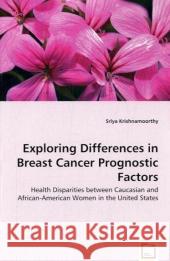Exploring Differences in Breast Cancer Prognostic Factors - Health Disparities between Caucasian and African-American Women in the United States » książka
Exploring Differences in Breast Cancer Prognostic Factors - Health Disparities between Caucasian and African-American Women in the United States
ISBN-13: 9783639021233 / Angielski / Miękka / 2008 / 96 str.
Exploring Differences in Breast Cancer Prognostic Factors - Health Disparities between Caucasian and African-American Women in the United States
ISBN-13: 9783639021233 / Angielski / Miękka / 2008 / 96 str.
(netto: 208,74 VAT: 5%)
Najniższa cena z 30 dni: 218,66
ok. 10-14 dni roboczych.
Darmowa dostawa!
The purpose of this study is to explore how differences in breast cancer prognostic factors contribute to the diminished survival rate of African-American women in the United States with breast cancer. Relative to Caucasian women, African-American women were found to be diagnosed with breast cancer at younger ages, with more aggressive tumor histology, and at more advanced stages. Age at diagnosis was found to be the most predictive factor for survival, where African-American women were almost two times more likely to be diagnosed with breast cancer before the age of 40 years. Differences in breast cancer age at diagnosis, histology, and stage are present by race. However, a unified effort from community leaders, public health educators, and clinical professionals to target underserved communities may improve mortality rates and create the social change necessary to eliminate breast cancer disparities between Caucasian and African-American women.
The purpose of this study is to explore how differences in breast cancer prognostic factors contribute to the diminished survival rate of African-American women in the United States with breast cancer. Relative to Caucasian women, African-American women were found to be diagnosed with breast cancer at younger ages, with more aggressive tumor histology, and at more advanced stages. Age at diagnosis was found to be the most predictive factor for survival, where African-American women were almost two times more likely to be diagnosed with breast cancer before the age of 40 years. Differences in breast cancer age at diagnosis, histology, and stage are present by race. However, a unified effort from community leaders, public health educators, and clinical professionals to target underserved communities may improve mortality rates and create the social change necessary to eliminate breast cancer disparities between Caucasian and African-American women.











